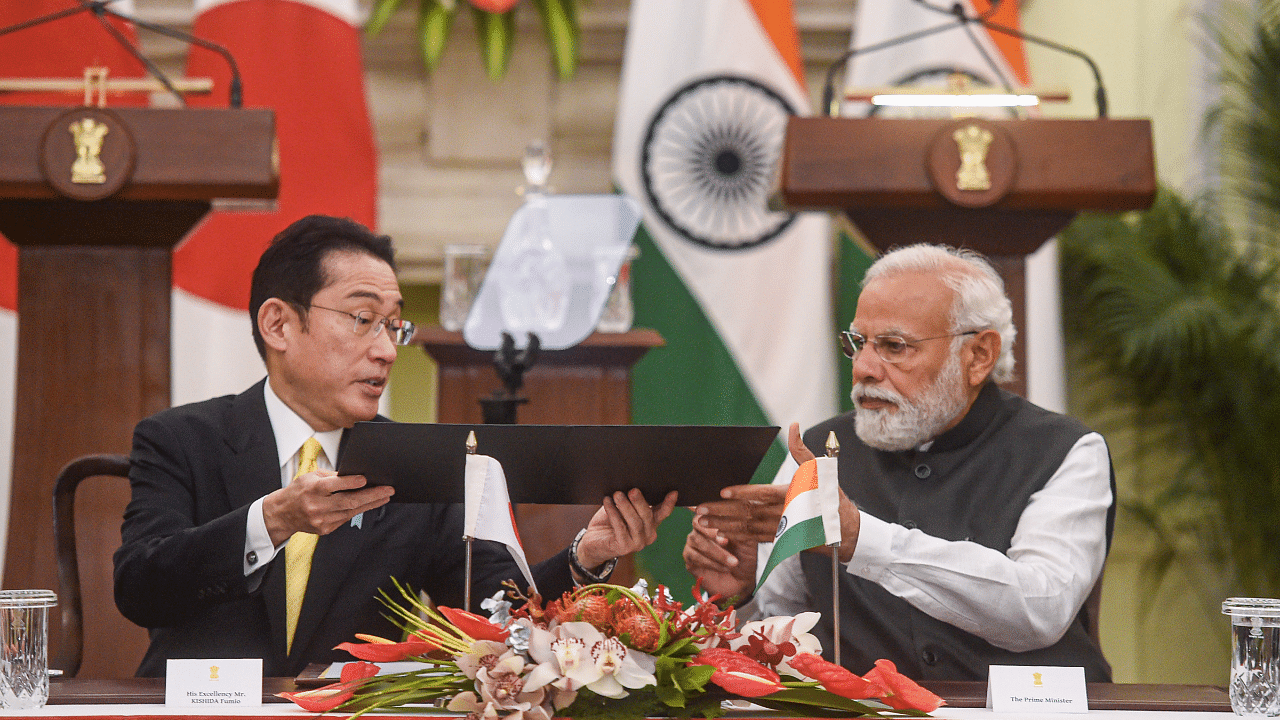
India on Saturday signalled a subtle change in its stand on Russia’s military operations in Ukraine, as Prime Minister Narendra Modi joined his Japanese counterpart Fumio Kishida in assessing “broader implications” of the conflict, particularly in the Indo-Pacific region — the scene of growing belligerence of China.
India has so far been dismissing any attempt to draw a parallel between Russia’s aggression against Ukraine and China’s belligerence in the Indo-Pacific region. It has also been rejecting the argument put forward by the United States that if Russia could get away with its aggression against Ukraine, it would encourage China to ratchet up its belligerence in the Indo-Pacific region.
Modi on Saturday continued to avoid directly calling out Russian President Vladimir Putin for ordering military operations in Ukraine. Kishida, however, condemned Putin for aggression against the East European nation. The two prime ministers together called for “immediate cessation of violence” in Ukraine, noting that dialogue and diplomacy was the only path for resolution of the conflict.
As Modi hosted Kishida for a summit in New Delhi, the new Japanese Prime Minister announced Tokyo’s new target for investing JPY 5 trillion ($42 billion or Rs 3.2 lakh crore) in India over the next five years. The Japan International Cooperation Agency (JICA) also pledged to provide over JPY 300 billion (over Rs 20,400 crore) for seven projects across India, including the third phase of the water supply and sewerage project in Bengaluru.
The two sides inked altogether six documents on the sideline of the summit, setting the stage for stepping up cooperation in cybersecurity and sustainable urban development as well as for stepping up economic partnership.
Foreign Secretary Harsh Shringla later told journalists that the two prime ministers had exchanged views on the Russia-Ukraine conflict. Kishida’s Press Secretary Hikariko Ono said that Japan and India were on the same page and the two prime ministers agreed that any attempt to change status quo by force anywhere in the world could never be tolerated.
The United States and the other western nations have been drawing a parallel between Russia’s aggression against Ukraine and China’s belligerence against India along the disputed border between the two nations as well as against Japan and other nations in the Indo-Pacific region. New Delhi, however, has been rejecting the argument put forward by President Joe Biden’s administration, with External Affairs Minister S Jaishankar stating that the two situations have not been analogous.
Modi, however, joined Kishida on Saturday to express “serious concern about the ongoing conflict and humanitarian crisis in Ukraine and assessed its broader implications, particularly to the Indo-Pacific region”, according to a joint statement issued after the summit in New Delhi.
The two leaders emphasized that the contemporary global order had been built on the United Nations Charter, international law and respect for sovereignty and territorial integrity of states.
The joint statement, however, had no reference to Russia or criticism for Russian President Vladimir Putin for ordering the launch of special military operations in Ukraine on February 24.
Modi and Kishida underscored the importance of the safety and security of nuclear facilities in Ukraine and acknowledged active efforts of the International Atomic Energy Agency (IAEA) towards it. They reiterated their call for an immediate cessation of violence and noted that there was no other choice but the path of dialogue and diplomacy for the resolution of the conflict.
The two prime ministers affirmed that they would undertake appropriate steps to address the humanitarian crisis in Ukraine.
Modi told Kishida about the India-China military stand-off in eastern Ladakh. Kishida also briefed Modi about China’s belligerence against Japan, particularly in East China Sea and South China Sea.
Modi will also have a virtual summit with Prime Minister Scott Morrison of Australia on Monday. India’s back-to-back engagements with Japan and Australia are happening just days after a virtual summit of the Quad convened by the United States President Joe Biden exposed the differences within the four-nation coalition over the Russia-Ukraine conflict. India argued that the Quad should keep its focus on countering China in the Indo-Pacific region and resisted the US bid to get the coalition formally condemn Russia’s military offensives against Ukraine. Though Australia and Japan supported the US, it was due to objection of India that the joint statement issued after the summit of the Quad had no direct condemnation of Russia for its military operations in Ukraine.
Modi and Kishida on Saturday emphasized that India and Japan, as two leading powers in the Indo-Pacific region, had a shared interest in the safety and security of the maritime domain, freedom of navigation and overflight, unimpeded lawful commerce and peaceful resolution of disputes with full respect for legal and diplomatic processes in accordance with international law.
